
By Victoria Keraj
Port workers from the International Longshoremen’s Alliance (ILA) went on strike to demand increased wages to counter the effects of inflation and continued job protection from automation. The strike began on Tuesday Oct.1, with ports on the east and Gulf coast shutting down. The ILA and the United States Maritime Alliance (USMX) reached a tentative agreement on Friday and work has been resumed.
According to a report done by the National Association of Manufacturers (NAM), “More than 68% of all containerized exports and more than 56% of containerized imports flow through east and Gulf Coast ports, representing an average daily trade value of more than $2.1 billion.” The ILA pledges to continue carrying military cargo and supplies for cruise ships.
Since June, talks of a new contract were stalled leading up to the current contract’s Sept. 30 expiration date. Companies have attempted to stockpile on inventory, but prices are expected to rise for items like produce that have short shelf lives.
“Food products likely to be impacted in the nearer term include seafood, coffee and fruits and vegetables grown outside the U.S. And while retailers that likely stocked up beforehand are buffered against an immediate impact, at some point bananas are going to expire, frozen seafood is going to defrost,” economist Daniel Munch told CBS.
A CNBC article states that if grocery items, previously shipped through east ports, will remain in stores, they will be obtained from different sources which will raise the prices of those products. Specifically bananas are an item that are expected to be affected.
“Bananas are the No. 1 fruit export in our produce department. We will get them, but it may be a longer transit from China, or fly and truck them in. This will drive up prices because of the price of logistics,” Stew Leonard jr., CEO of Stew Leonard’s told CNBC. The same article also warns of increasing food prices due to panic buying, like previously seen during the Covid-19 pandemic.
A potential increase in food prices during a period of economic inflation could be detrimental for college students. Brooklyn College’s food pantry serves as a resource to more students during this period.
New York Governor Kathy Hochul, in a briefing held about preparation for the strike urged consumers against panic buying and gave reassurance that essential goods would not be in danger of running out.
“We don’t anticipate shortages of essential goods anytime soon […] people do not need to rush out to the grocery store and stockpile goods like they did during the pandemic […] we do not want to see people reach the level of anxiety, because we are not there,” she said.
One worker on strike told CBS news that they are more worried about automation than wages.
“I’m really thinking automation is going to be more important. I mean, it doesn’t make sense to pay us 100 dollars an hour and robots are doing our work so we have no hours during the week.”
Anthony Mundi, a worker on strike, stressed to CBS news the concern over automation. “We’re looking ahead to the future. Going to work now at the risk of losing our jobs 5 or 10 years down the road is very short-sighted.”
Workers held up picket signs that said “Machines don’t feed families.” Loss of jobs due to automation is a main concern and is non-negotiable for the ILA. An article posted by the ILA stated: “We will not accept the loss of work and livelihood for our members due to automation. Our position is clear: the preservation of jobs and historical work functions is non-negotiable.”
As part of their tentative agreement, the current master contract between the ILA and USMX has been extended to Jan.15 to allow more time for negotiations. Workers received a 62% wage increase which is higher than the USMX’s initial offer of a 50% increase.
